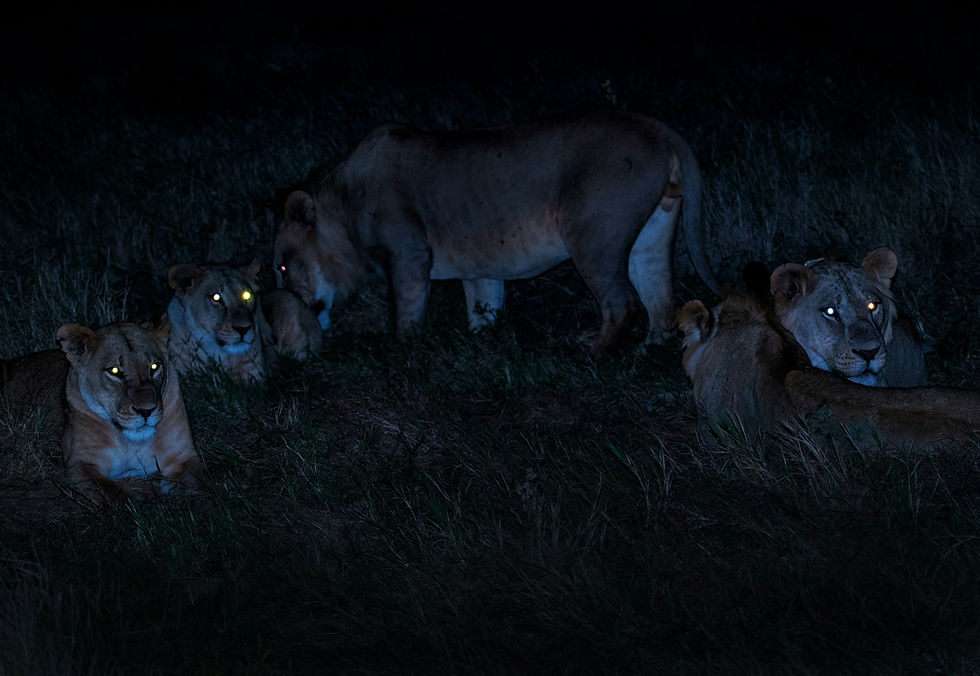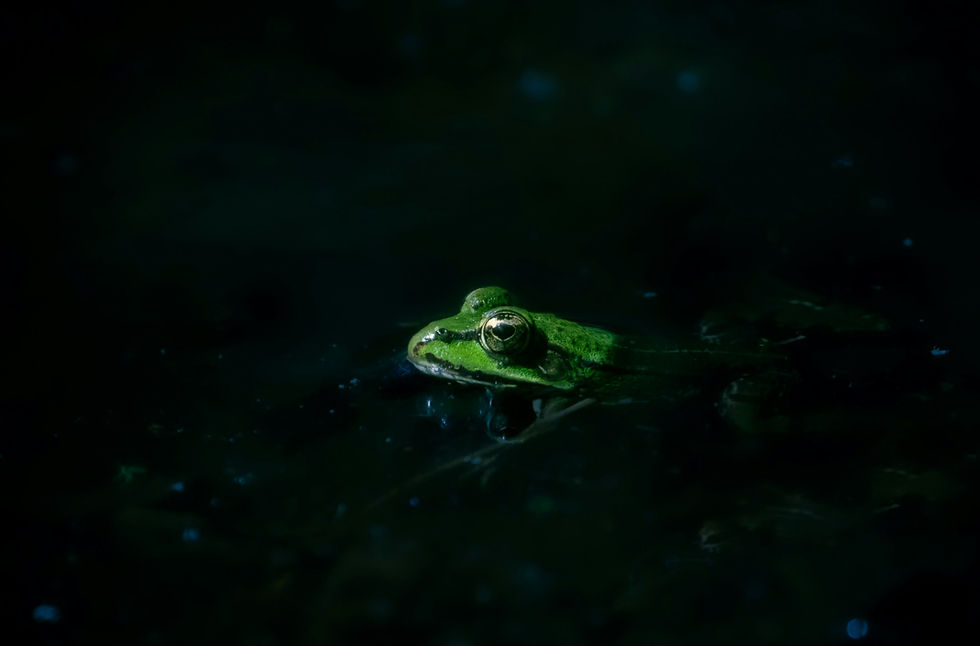Nocturnal Wildlife Encounters: Ethical Night Safaris & Walks
- The Editor

- Jul 2, 2025
- 4 min read
When daylight fades and shadows lengthen, a different world stirs. The rustle in the grasses, the gleam of eyes in the dark, the quiet prowl of a predator on the move—nightfall awakens an untamed, often unseen realm.
For the intentional traveler, nocturnal wildlife experiences offer a rare opportunity: to witness Earth’s natural rhythms when they are most alive and least observed. But not all night safaris or walks are created equal. This guide highlights ethical, awe-filled nocturnal wildlife encounters—ones that honor the creatures we seek and the ecosystems they call home.

Why Travel at Night?
More than 60% of terrestrial animals are nocturnal. From elusive big cats and bush babies to iridescent frogs and ancient crocodiles, much of nature thrives after dark. Night travel isn’t just novel—it’s biologically rich.
Some reasons to consider it:
Unique wildlife behavior: Predation, courtship, and feeding often happen under cover of darkness.
Reduced heat & crowds: Especially in warmer climates, animals and humans both benefit from cooler, calmer nights.
Heightened sensory awareness: With vision limited, sounds and smells become part of the journey.
Improved conservation learning: Ethical guides often share deeper ecological insights during quieter, more focused tours.
When done responsibly, night travel offers something rare: intimacy without intrusion.
What Makes a Nocturnal Safari Ethical?
Ethical noctourism places animal welfare, habitat protection, and cultural respect at the core. Look for experiences that:
Use red-filtered or low-lumen lighting to protect animal vision.
Limit group size to reduce stress on wildlife.
Avoid spotlighting or following animals for long periods.
Operate in designated zones, with proper permits.
Employ trained naturalists and local community members.
Reinvest into conservation and anti-poaching efforts.
The goal is presence, not performance. Ethical guides offer patient, low-impact access to the wild—often enhancing the experience with storytelling, tracking skills, and ecological context.
7 Ethical Nocturnal Wildlife Destinations
1. South Luangwa National Park, Zambia
Regarded as the birthplace of walking safaris, this park also leads in low-impact night drives. Spot leopards on the hunt, civets slinking through shadows, and elephants moving by moonlight.
Why it stands out: Safari guides are highly trained in animal behavior and conservation education.
2. Masai Mara Conservancies, Kenya
Unlike the main reserve, private conservancies such as Naboisho or Ol Kinyei allow night drives. Visitors may witness lions feasting, nocturnal birds hunting, and elusive species like the aardwolf in motion.
Why it stands out: Community-owned models prioritize local empowerment and sustainable land use.
3. Madikwe Game Reserve, South Africa
This malaria-free reserve is known for black rhinos, brown hyenas, and even pangolins. Lodges here conduct night safaris using red light filters and focus on education-driven tourism.
Why it stands out: Lodges contribute directly to anti-poaching units and research programs.
4. Bandhavgarh Tiger Reserve, India
Known for its tiger population, this reserve permits limited-access night safaris in buffer zones. With patience, travelers may glimpse sloth bears, jungle cats, or an Indian leopard melting into the dark.
Why it stands out: Operators are tightly regulated and often work in tandem with conservation NGOs.
5. Queen Elizabeth National Park, Uganda
At night, this biodiverse gem brims with activity—lions descend from trees, hippos graze, and hyenas call across the savannah. Guided drives from Mweya Peninsula offer immersive, respectful encounters.
Why it stands out: Tours support local conservation programs and prioritize ecological integrity.
6. Danum Valley, Borneo
This primary rainforest hosts some of Asia’s most elusive creatures, including tarsiers, clouded leopards, and gliding frogs. Night walks led by researchers blend science with hushed reverence.
Why it stands out: Guests often stay in research lodges that fund biodiversity studies.

7. Tambopata National Reserve, Peru
In this Amazonian corridor, river night tours and jungle walks reveal caimans, tarantulas, owls, and rare amphibians. Lodges like Refugio Amazonas specialize in bio-sensitive excursions.
Why it stands out: Experiences are led by Indigenous and locally trained naturalists, with a focus on habitat protection.
What to Expect
Nocturnal wildlife experiences prioritize presence, not adrenaline. Expect:
Slow pace: No rushing—sightings come to those who wait.
Minimal lighting: Red lights or filtered beams preserve animal routines.
Silence: Spoken in whispers, or not at all.
Uncertainty: You may see a jaguar—or just glowing fungi. Both matter.
Atmosphere: The night itself is the attraction—stars, scents, textures.
Embrace unpredictability. The most powerful moments often happen when nothing seems to be happening at all.
How to Prepare
Mindset:
Be patient.
Observe actively.
Celebrate subtlety over spectacle.
Pack:
Long sleeves and closed footwear
A red-light headlamp
Binoculars
Lightweight scarf or buff
Field journal or audio notes app
Bug repellent (natural or low-impact)
Why It Matters
Nocturnal ecotourism isn’t about Instagrammable sightings—it’s about reconnection.
It nurtures empathy by revealing hidden ecosystems and overlooked behaviors. It funds conservation in regions where biodiversity faces nightly threats. And it rewires the way we perceive the dark: not as danger, but as depth.
In many cultures, night is not an absence but a presence—a space of clarity, transition, and transformation. Ethical night safaris honor this. They ask us not to conquer the wild, but to listen to it.
🔗 Keep exploring the topic of Noctourism here:




Comments